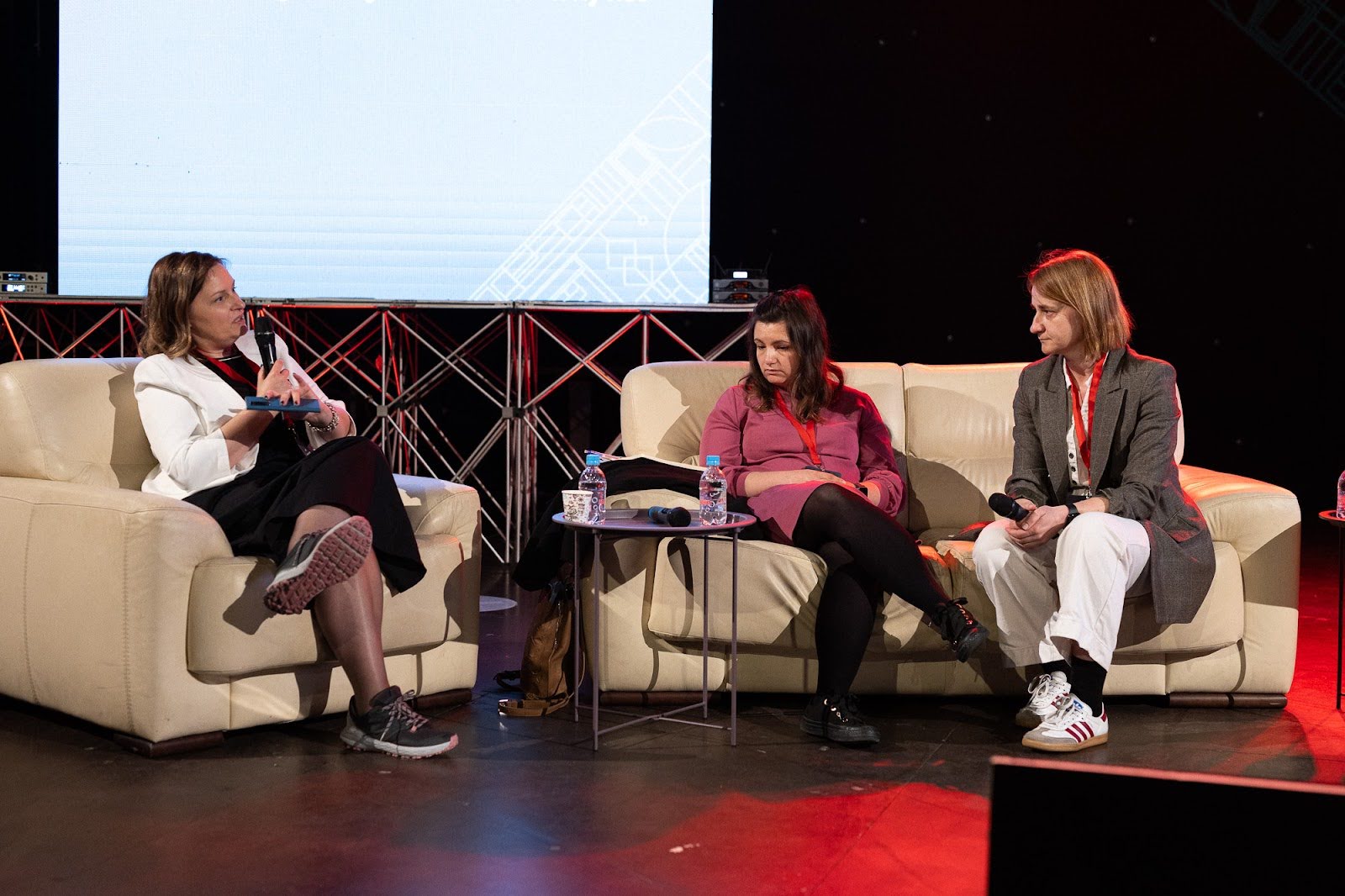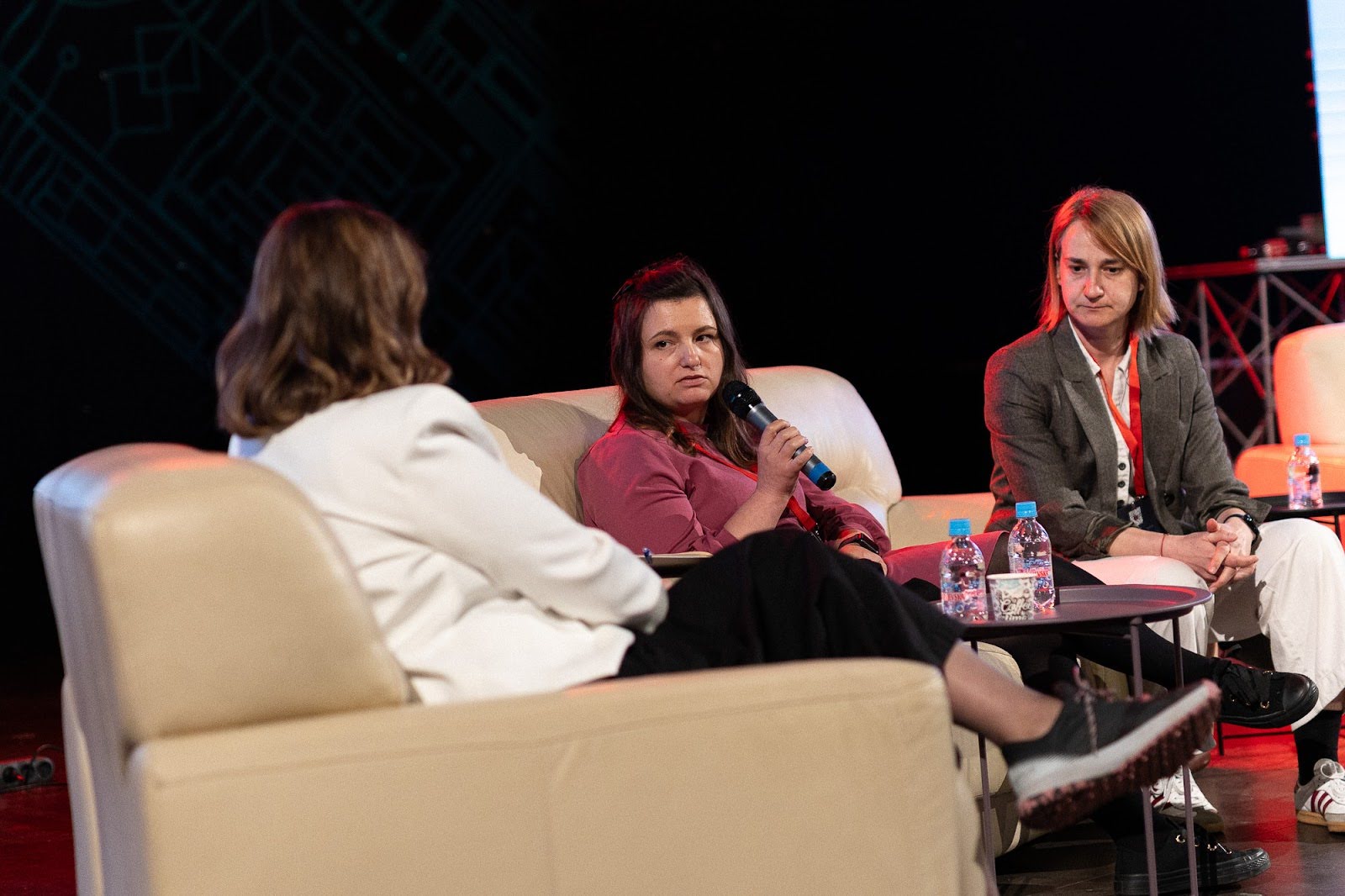Human Rights at a Crossroad: Activists Reflect on Challenges and the Road Ahead
On Thursday afternoon, the amphitheater of Dom mladih hosted a panel discussion on the state of human rights in the region. Titled “Human Rights at a Crossroad”, the session brought together prominent voices in activism to explore current obstacles and envision future directions.

Moderated by Tijana Cvjetićanin from the civic association “Why not”, the panel featured Iva Zelić from Libela and Emina Bošnjak from the Sarajevo Open Centre.
Tijana opened the panel by welcoming the audience and introducing the participants, setting the tone for a conversation focused on women’s rights and also women’s reproductive rights and the rights of LGBTIQ people.
Tijana made a really strong point by highlighting how different issues like divisions within the feminist movement and conflicts between women’s rights and trans rights—are being used politically. She gave a powerful example: on his first day back in office, Donald Trump signed an executive order with a very telling title: “Defending women from gender ideology extremism and restoring biological truth to the federal government.”
She pointed out how ironic that title is and it claims to defend biology, but actually goes against what science says about sex and gender. The bigger goal of this movement, according to Tijana, is to roll back many of the rights that have been gained over the years. It tries to bring back ideas of the so-called natural family, traditional gender roles, and the belief that there are only two sexes.
She concluded her opening by underscoring the urgency of the panel’s discussion: to explore how anti-gender movements are gaining ground globally, how they threaten both human rights and democracy, and what can be done in response.
After Tijana’s introduction, the conversation continued with Emina, who expanded on the Orange Report and the motivations behind dedicating a full chapter to anti-gender movements in Bosnia and Herzegovina. She explained that the report aims to monitor the state of women’s rights and gender equality in the country, not only to track progress or stagnation, but also to critically assess the role of policymakers and the broader socio-political environment.

Emina emphasized that 2024 marked a turning point: while anti-gender ideologies were not new to the region, that year witnessed an unexpected surge in organized activity. New civil society groups emerged rapidly, aligning themselves with political elites, and began pushing back against hard-won rights, particularly in areas like LGBTIQ rights and gender-based violence legislation. This mobilization, she noted, didn’t just mirror trends from neighboring countries like Serbia and Croatia, but was now deeply embedded in the political crisis in Bosnia and Herzegovina, especially within Republika Srpska.
Following Emina, Iva offered a regional perspective, focusing on the long history and evolution of anti-gender movements in Croatia. She explained that these movements began almost two decades ago, initially opposing sex education and gender ideology under the guise of protecting parental rights. Over time, they became highly organized, adopting civil society formats, initiating citizen campaigns, and leveraging democratic tools like referendums.
A major turning point came in 2013 with a national referendum that amended Croatia’s constitution to define marriage strictly as a union between a man and a woman. This victory significantly boosted the movement’s visibility and momentum. Since then, their presence has become institutionalized: annual “Walks for Life” in cities across Croatia promote anti-abortion narratives under the banner of protecting the “culture of life,” while prayer groups regularly gather in front of hospitals and public squares to advocate for conservative gender roles and values.
Iva underlined that their growing political influence is key to their success: these groups now have allies in government, including representatives from far-right parties, which allows them to shape policy debates and push their agenda within official institutions.

In the final part of the panel, several questions were raised from the audience, covering topics such as the motivations behind anti-gender movements, the role of women’s rights in anti-migrant rhetoric, and the growing connections between far-right parliamentary and non-parliamentary groups.
Emina explained that in Bosnia and Herzegovina, anti-gender groups are still mostly organizing through civil society, but there’s concern they may soon try to enter politics, as seen in other countries. She noted that these movements are powerful because they exploit public confusion about sex, gender, and identity—often targeting trans and non-binary people. She also mentioned that political elites use these issues to distract from corruption and to strengthen their positions, even in EU negotiations. Importantly, she highlighted that the women’s movement in Bosnia has not turned against the LGBTI community, instead women’s organizations have shown strong solidarity and support.
Iva added insight from Croatia, confirming that the links between far-right groups and political parties are well-documented and increasingly influential. She warned that one of their key goals is reshaping legislation and education, even promoting homeschooling to bypass state curricula. Iva also stressed that the broader strategy involves building alternative systems that reject democratic and inclusive values.
Author: Emina Kuštrić